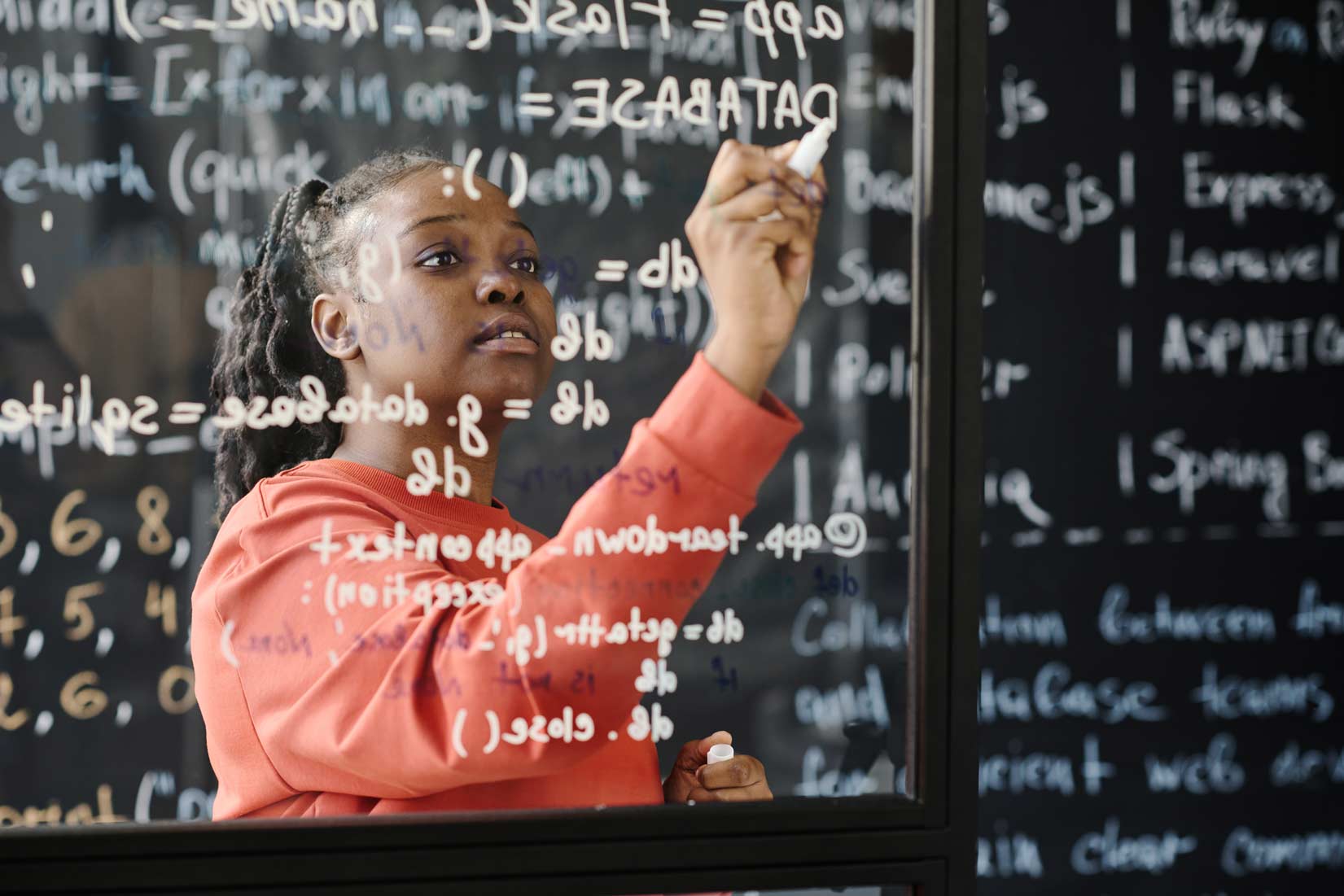
by Amy Kim, Ph.D, Physical Chemistry and Executive Director of EnCorps, Inc.
Numbers Don’t Lie
Here in the United States, we have a huge math education crisis on our hands. According to the most recent national performance data, US students’ understanding and mastery of mathematics reached an all-time low on both the National Assessment of Educational Progress (NAEP) and the Program for International Student Assessment (PISA).
The NAEP, commonly referred to as The Nation’s Report Card, showed that US students in grades 4 and 8 experienced the largest NAEP mathematics score declines since the assessments were first administered in 1990. At present, only 26% of eighth grade students in our country are math proficient, and students from socio-economically marginalized backgrounds have proficiency rates that are even more dismal thanks to inequities inherent to our public education system.
Of the 81 countries representing 700,000 students who took the PISA—which provides key insight into US students’ performance relative to other students globally—the US didn’t even make it into the top 25th percentile. Equally concerning, the share of US students with confidence in their ability to learn math autonomously was shown to be lower than average when compared to students in dozens of other countries.
Triangulating across these different assessments to investigate student performance between 2018 and 2022, researchers, analysts, and education leaders have arrived at the same conclusion: the US is failing our students and losing important ground when it comes to being a STEM education leader on the global stage.
And, despite students experiencing greater struggles in math than in reading for years even before the pandemic, math education continues to play second fiddle in terms of national policy, curriculum overhauls, and school-based interventions. Approximately 48% of schools nationwide employ reading specialists, and schools are mandated in 32 states to provide specific training, curricula, and support plans around reading. Alarmingly, those respective numbers are just 23% and 7 for math.1
As a matter of urgency, it is now time to dedicate ourselves to solving the national math education crisis with renewed energy, focus, and determination.
1 + 1 = The Two-Career Solution That Can Help Solve Our Crisis
When it comes to identifying and implementing math learning solutions that truly move the needle on student performance, EnCorps, Inc. is in the vanguard. A California-based 501(c)(3) that advocates for STEM educational equity, we connect STEM professionals with middle and high schoolers in under-resourced communities to counter the systemic injustice preventing them from accessing high-quality STEM learning. EnCorps has impacted nearly 250,000 children through our longstanding presence in California for over 15 years, as well as through our ongoing efforts to expand to more states, including New York.
EnCorps invites STEM professionals to transition into second-act careers as 6-12 public education teachers and tutors. Through robust training and real-world teaching practicums, EnCorps supports STEM professionals to master education theory and best practices while learning to leverage their unique experiences as former career scientists, technologists, engineers, and mathematicians in their approach to teaching and lesson planning.
Through the EnCorps STEM Teachers Program®, STEM professionals who are committed to closing the STEM education equity gap serve as EnCorps Fellows who teach various subjects ranging from physics and math to computer science. More than 50% of EnCorps Fellows identify as people of color and 64% have advanced degrees. As emerging educators, they provide a valuable presence on school campuses and in the classroom, serving as role models for students who otherwise might not have access to STEM professionals who, in many cases, shared similar life experiences growing up and often look like them.
EnCorps’ other flagship offering, the STEMx Tutors Program, engages STEM professionals and college students as volunteers who tutor middle school math online. Tutors help students make notable strides in their math learning, supporting them to increase math skills and confidence prior to entering high school. Tutors help demystify math concepts for students, linking theory to practical examples they have encountered in their workplace, college campus, or research. As tutors share their own STEM journey, mentees can see themselves in their tutors and, in turn, believe that they also belong in STEM.
The Identity Equation: Inspiring Our Nation’s Youth to See Themselves in STEM
When students are provided with support that allows them to feel excited about learning the subject matter—and when they can see their hard work translating into their personal abilities and grades—they are motivated to come to school, pay attention, and build on their success. Using expert, relatable STEM role models as teachers and tutors who can leverage their lived experience to help make STEM learning come alive represent some of the most compelling strategies for motivating students and effectively addressing the scope of our nation’s current math learning challenges.
Inspiring from Inside the Classroom: EnCorps STEM Teachers
In the words of Dr. LaTeira Haynes Zavala, EnCorps Fellow and Biomedical Engineer, “I always had great teachers offering encouragement, advice, inspiration. I thought, how many more students like me are out there? We have all these scientific minds not being tapped into because students might not be pointed in that direction. One of these kids could cure cancer, solve the world’s great problems.” Now a Biology and Physics Teacher at King Drew Medical Magnet High School in Los Angeles, Dr. Zavala’s observation couldn’t be more fitting.
Students’ ability to see themselves represented in their teachers can enhance their understanding, engagement, and motivation to learn. Educators from similar backgrounds often bring a deep understanding of students’ cultural experiences and can use references that are relevant to students’ daily lives when teaching complex concepts and building rapport in the classroom.
Embodying the notion that ‘if they can see it, they can be it’ EnCorps recognizes that relatable role models are exceedingly effective in bringing about academic learning gains and assuring our nation’s most marginalized students that they, too, belong in STEM. STEM professionals like Dr. Zavala who are entering the teaching profession through EnCorps are uniquely positioned to inspire the next generation of US students to pursue STEM careers.
Building Confidence Outside the Classroom: EnCorps STEM Tutors
High dosage math tutoring has been named one of the most promising strategies to help our nation’s students close academic gaps precipitated by the pandemic. The current White House Administration’s Improving Student Achievement Agenda for 2024 highlights the fact that quality tutoring programs can significantly accelerate student learning and support students to gain as much as 1.5 years of achievement in math. States, districts, education nonprofits, philanthropic organizations, and others in education circles are now calling for more resources to implement this effective instructional technology to accelerate student learning, especially as Elementary and Secondary School Emergency Relief (ESSER) funds expire in the near future.
EnCorps’ STEMx Tutors Program undoubtedly answers this call. Volunteer tutors and middle school students who struggle in math meet 1:1 in virtual tutoring sessions for one hour per session, twice a week for approximately 10 weeks each semester. Our 2022-23 impact data shows that 84% of students increased their math proficiency because of the time they spent with their tutor. According to the data, 20 or more hours of online math tutoring by a STEM professional or STEM college student correlates with an impressive 22-point increase in diagnostic scores for middle schoolers in under-resourced communities who take part in the EnCorps STEMx Tutors Program.
EnCorps tutors not only help their mentees increase math performance, but also help students develop soft skills and a strong STEM identity, helping to break down stressors around math and preconceived ideas that students might have about an inability to become “good” at what they’re learning. Our impact data shows that after participating in EnCorps’ STEMx Tutors Program, 84% of middle school participants reported feeling more confident in math class because of their tutor’s help, 82% learned about different kinds of STEM jobs along the way, and 67% believe they belong in a math or science job just as much as anyone else if that’s the career they ultimately decide to pursue.
In Summary
EnCorps is addressing the math score gap for thousands of students in the US and empowering them through evidence-based strategies to succeed.
Ample research supports the profound impact that educators from similar backgrounds can have on improving academic outcomes. For many students, the EnCorps Fellow teaching in their classroom is the first STEM professional they have ever encountered. In addition to benefiting from exposure to Fellows’ real-world STEM experience and advanced education, Fellows also often mirror students’ backgrounds and have shared lived experiences. This makes it more likely for students to believe in their own potential for STEM success, both in secondary school and beyond.
The efficacy of math tutoring has also been well-documented. States and districts are now being encouraged to double down on high dosage math tutoring as one of the key evidence-based strategies that move the needle on student learning, particularly in math. EnCorps’ STEMx Tutors Program answers this call by ensuring students receive personalized instruction tailored to the math learning areas where they need the most support, as well as relational support from their tutors that fosters confidence in their math abilities and a stronger STEM identity for the long term.
At EnCorps, we will continue to be laser-focused on doing our part to close our nation’s glaring gaps in math education. While we acknowledge the importance of reading support, we firmly believe that, in light of the urgency of the math education crisis, the nation must drastically ramp up our investment in helping students to succeed in math. As critical ESSER funds expire, EnCorps programs offer a proven track record and cost-effective solution for under-resourced public schools. We welcome the chance to share our decades of learning and impact with others, and seek to forge new partnerships with districts, schools, governments, and philanthropy to bring our evidence-based programs to more of our nation’s students who need them.
 Connect with Amy on LinkedIn.
Connect with Amy on LinkedIn.
_____________
Sources:
1 Korbey, H. (2024, February 20). Reading Supports Abound in Schools, But Effective Math Help Much Harder to Find. The 74. https://www.the74million.org/article/reading-supports-abound-in-schools-but-effective-math-help-much-harder-to-find/
